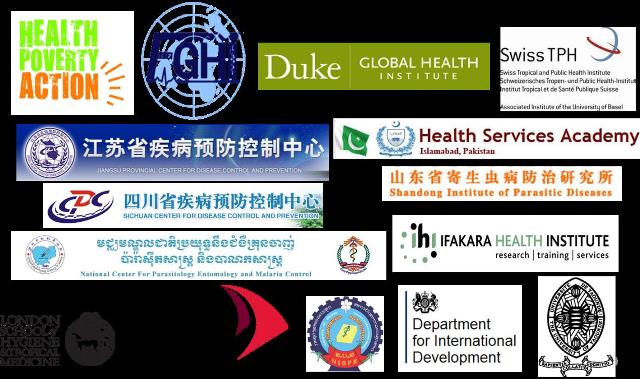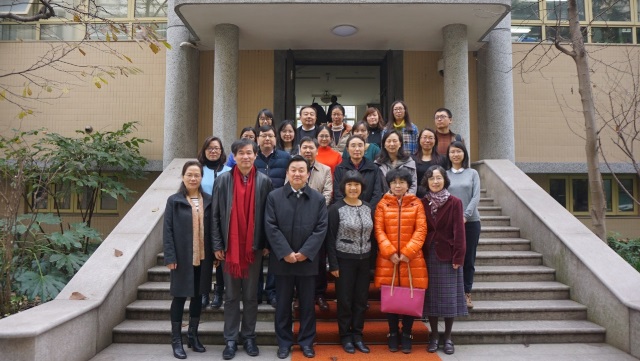The external assessment on GHSP-OP2“Centre of Excellence in Health Development Aid in China: Capacity Building and Information Dissemination” undertaken by NIPD completed successfully
National Institute of Parasitic Diseases, Chinese Center for Disease Control and Prevention (NIPD, China CDC) undertook China-UK Global Health Support Programme Output 2 — “Centre of Excellence in Health Development Aid in China”. According to the research design, experts and scholars outside the project team should be invited to the external assessment. The experts of the assessment team are from Peking University, Dalian Medical College, China CDC, Wuhan University, Zhejiang Academy of Medical Science, Anhui Institute of Schistosomiasis Control.
During 18th-19th December 2016, the external assessment meeting was held in Shanghai, besides the external assessment experts mentioned above, 30 cadres from the partner institutes of OP2 attended the meeting, including Fudan University, Health Poverty Action, Jiangsu CDC.
On 18th December, the core members of NIPD’s OP2 team highlighted the progress and the output in policy researching, capacity building and service of consulting, during the 3 years of project running. The in-time finished activities were confirmed by the external assessment team, and further suggestions were given according to the contents of report. First, in terms of research activities, synthesis and analysis of the aid model of International-China Aid Project and South-South Cooperation Project should be added and highlighted. Second, in terms of seminars, summary from the types of knowledge dissemination and capacity building could be elaborated more. Third, in terms of consulting service, further analysis of the contribution to the system building of prevention and control of global tropical diseases were also needed.
On 19th December, the external assessment team assessed the whole project by listening to reports, reviewing output files, participant interviews, which moderated by Professor Guo Yan of Peking University.
In the output report, the Principal Investigator (PI) Prof. Zhou Xiaonong introduced the overall progress, and highlighted 3 aspects of the research results, including the establishment of Health Development Aid Center, the improvement of the capacity of health consulting among government officials and the capacity of tech-aid among specialists, and the improvement of the practicing capacity in the field of Public Health. After that, the manager from all cooperation institutes reported respectively. Professor Qian Xu of Fudan University introduced the situation of receiving international aid in the field of diseases prevention and control in Pakistan, and gave suggestions about the key cooperation fields, the way and priority projects of cooperation. The team of Professor Xu Biao of Fudan University introduced the Tuberculosis Project on the implementation and capacity-building of the Gates Foundation in China, and presented the characteristics, experiences and lessons of the Gates Foundation. The director of Health Poverty Action, Zhang Jun presented the progress and effectiveness of China and Myanmar Global Fund Project of malaria prevention and control, highlighted that as a social organization, HPA could help solving the problem of cross-border infectious diseases to a large extent. Ms. Ba Lu, the deputy chief physician of Jiangsu CDC, introduced the results of a comparative evaluation study between the two Chinese medical teams in Zanzibar and Malta, and gave 8 suggestions of improving the work quality of foreign medical team. During the staff interview, the feelings about the effectiveness of the OP202 running and recommendations and expectations were put forward from the staff’s own understanding, including the researchers, subjects of seminars, core members of cooperation institutes.
Through activities above, the external assessment team of the OP2 believed that, NIPD finished the working contents according to the project design, has reached the overall objective of the project, cultivated and stocked a group of professional talents majoring in global health combined with the tropical diseases prevention and control, summed up and extracted the significant experiences and lessons with the infectious diseases. NIPD established the Global Health Center under the supportive of the project, and undertook the secretariat work of WHO Collaborating Centre for Tropical Diseases and Global Health Branch of Chinese Preventive Medicine Association, building the solid base for becoming one of the Centres of Excellence in Health Development Aid in China. Experts also hoped that the successful exploring experiences could combine with the Chinese Global Developing Strategy, providing better platform for China leading Global Health.
Project Introduction
The period of the project, Centre of Excellence in Health Development Aid in China: Capacity building and information dissemination, was from March 2014 to December 2016, and the total amount was ¥39,998,340,000. Researcher Zhou Xiaonong was the project principal investigator. The object of the program was to strengthen the capacity of aid-assistant among Chinese government staff and professional staff, especially to improve the bilateral and multilateral cooperation in the field of Public Health through establishing health developing aid-assistant core center. According to the whole object, the project focused on the following 3 aspects: 1. Improving the capacity of health developing aid-assistant researching and data analyzing through case study. 2. Improving the capacity of training by seminars, teaching material and websites. 3. Improving the consulting service and influence through bilateral and multilateral cooperation projects. This project was host by NIPD, applying with 15 partners, foreign and domestic, including 5 domestic partners and 10 foreign ones.
The five domestic partners are, Global Health Institute of Fudan University, Health Poverty Action, Jianghsu CDC, Sichuan CDC and Shandong Institute of Parasitic Diseases.
The ten foreign partners are, including 5 low - and middle - income countries from Asia and Africa, Cambodia National Center for Parasitology Entomology and Malaria Control, Lao National Institute of Health, Pakistan Health Services Institute, Tanzania Ifakara Health Institute of Health and Cameroon University of Yaoundé. The other five from the Organization for Economic Cooperation and Development, including the London School of Hygiene and Tropical Medicine , Duke Global Health Institute, Liverpool School of Tropical Medicine and the Swiss Tropical and Public Health Institute.



